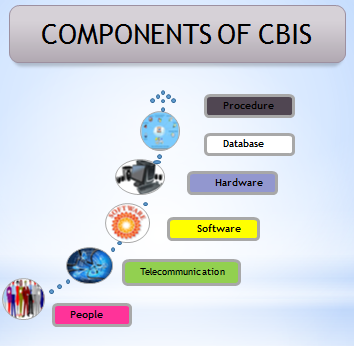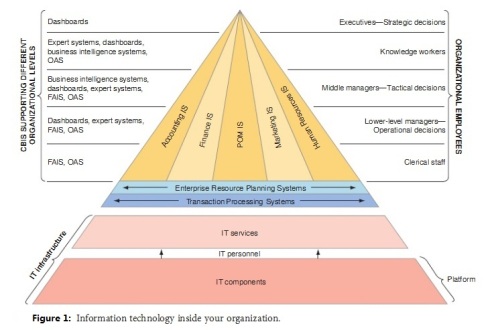learning objectives
1.1 Why Should I Study Information Systems?
Informed User: a
person knowledgeable about information systems and information technology.
the importance of being an informed user:
1-Get more value of the technology or systems used.
2-Improve an organization's performance,teamwork and productivity.
3- Help
selecting new information systems / applications.
4- Helps to start a new business (be an entrepreneur).
5- Recommend and select new applications.
6- Anticipate the future impact of new systems.
* IT provide more Job opportunities.
* It's hard to manage information resources because :
1- it has enormous value to the organization . (being hostage to IS)
2- ISs are expensive to acquire,operate and maintain .
3-the evolution of the management information systems.
1.2 Overview of Computer-Based Information Systems
 Data : elementary
description of things, events, activities and transactions that are recorded,
classified and stored but are not organized to convey any specific meaning.
Data : elementary
description of things, events, activities and transactions that are recorded,
classified and stored but are not organized to convey any specific meaning.
Information: data
that is organized and structured within a context, and
provides meaning

Knowledge: information organized and processed to
convey understanding, experience, accumulated learning and expertise as they
apply to a current problem or activity.
computer based information system: are information systems that use computer technology to perform some or all of their intended tasks.computer based information system components:
Information Technology Infrastructure:
The
IT components, IT services and IT personnel that support an entire
organization.
IT
components
(platform) :consist
of hardware, software, telecommunications and networks, and wireless
communications.
IT
services :
consist
of data management, managing security and risk, and systems development.
IT
personnel: use
IT components to produce IT services.
*Types
of Information Systems :
1.3 How
Does IT Impact Organizations?
IT impacts employees at work
1.3 How Does IT Impact Organizations?
IT impacts employees at work
Functional area
information systems (FAIS)
support
particular functional areas [HR, Marketing, Manufacturing, Finance] in an
organization.
Enterprise resource
planning (ERP) systems
tightly
integrate the functional area information systems via a common database
Transaction
processing systems (TPS)
support the monitoring, collection,
storage, and processing (real time) of data from the organization’s basic
business transactions.
Inter-organizational information systems
connect
two or more organizations.
Office automation systems
(OAS)
support
the clerical staff, lower and middle managers, and knowledge workers. These people use OASs to development
documents, schedule resources, and communicate.
Business intelligence
systems (BI)
provide
computer-based support for complex, non-routine systems, primarily for middle
managers and knowledge workers.
Expert Systems
attempt
to duplicate the work of human experts by applying reasoning capabilities,
knowledge, and expertise within a specific domain.
Dashboards
support
all managers by providing rapid access to timely information and direct access
to structured information in the form of reports.
IT reduces the number of middle managers.
IT changes the manager’s job.
Ergonomic:
the
science of designing machines and
work
settings that minimize injury and illness
1.4 Importance
of Information Systems to Society
1.4 Importance
of Information Systems to Society
IT Affects Our Quality of Life
Robot Revolution on the Way
Improvements in Healthcare





No comments:
Post a Comment